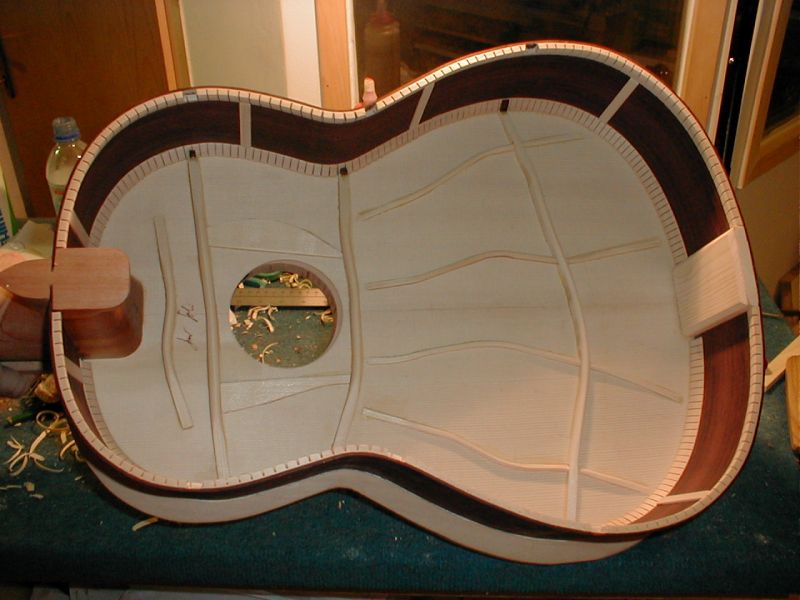Interesting hypothesis for the learned to consider
- sebastiaan56
- Blackwood
- Posts: 1274
- Joined: Sun Oct 28, 2007 5:23 am
- Location: Blue Mountains
Interesting hypothesis for the learned to consider
make mine fifths........
very interesting,
Does he ban sandpaper from ever touching a soundboard?
would think that final preparation and finish application would modify these results.
A little suspicious of some of the graphs without numbers.
Selling (for an extra 100 euros) a digital moisture recorder as a prerequisite to warranty for cracks and deformation is an interesting proposition
Thanks Sebastion.
Does he ban sandpaper from ever touching a soundboard?
would think that final preparation and finish application would modify these results.
A little suspicious of some of the graphs without numbers.
Selling (for an extra 100 euros) a digital moisture recorder as a prerequisite to warranty for cracks and deformation is an interesting proposition
Thanks Sebastion.
I think this is a bit hairy fairy.
The only thing that changes when sanding, planing and thicknessing and adjusting feed speed is surface finish.
-Sanding, flat with thousands of scratch marks (Varies on Grit)
-Planing (machine), Larger ripples slightly irregular.
-Thicknessing, smaller ripples spaces evenly this changes as you alter feed speed.
So IMHO the only thing changing vibrations would be these ripples caused by machining which in all cases get sanded down to a micro finish with sand paper anyway at final finish.
The only way you could test this would be to make say 3 - 4 identical Guitars using different machining techniques.
The only thing IMO that would make and acoustic change would be if the timber was Air dried or kiln dried.
That's my 2cents
Cheers
Tim
The only thing that changes when sanding, planing and thicknessing and adjusting feed speed is surface finish.
-Sanding, flat with thousands of scratch marks (Varies on Grit)
-Planing (machine), Larger ripples slightly irregular.
-Thicknessing, smaller ripples spaces evenly this changes as you alter feed speed.
So IMHO the only thing changing vibrations would be these ripples caused by machining which in all cases get sanded down to a micro finish with sand paper anyway at final finish.
The only way you could test this would be to make say 3 - 4 identical Guitars using different machining techniques.
The only thing IMO that would make and acoustic change would be if the timber was Air dried or kiln dried.
That's my 2cents
Cheers
Tim
[img]http://i4.photobucket.com/albums/y116/ImBroken8/annoyingbug.gif[/img]
http://holeshotnitro.com/
http://holeshotnitro.com/
I agree with Tim. The proportion of the final surface we are talking about here is tiny. Maybe 99.99% of the wood on a planed and a sanded top are within the thickness of the top and are the same. Also, seems a lick of sealer would bind any loose wood fibres and further reduce any percieved difference.
Unless they are saying the thinning process somehow effects the properties of the whole top, not just its surface. But they have not really explained it very well.
Dom
Unless they are saying the thinning process somehow effects the properties of the whole top, not just its surface. But they have not really explained it very well.
Dom
You can bomb the world to pieces,
but you can't bomb the world to peace!
but you can't bomb the world to peace!
No implications for guitarmaking could as yet be made. Perhaps the observed correlation is not even important for making resonant boards of real guitars. Only future experiments can help us understand the interplay between the cutting process and the acoustic properties of the resultant resonant board. However, the current results and experimental set-up provide a good starting point to address this larger question.
tht's what struck me at the end....
tht's what struck me at the end....
- graham mcdonald
- Blackwood
- Posts: 473
- Joined: Thu Oct 25, 2007 11:57 am
- Location: Canberra
- Contact:
He uses lots of big scientific words and formulae which may or may not make any sense at all. It needs someone like Al Caruth or Graham Caldersmith to interpret for the rest of us. The wiggly braces are just weird, and the 'rule of consonance-dissonance' is equally as puzzling.
We should remember that Michael Kasha's scientific reworking of the guitar soundboard hasn't changed the wold in the 30 or so years since it was touted as the next Great Leap Forward in guitar design. Greg Smallman has shown us that the important thing is the stiffness and the resonant modes of the soundboard. This bloke's wiggly braces might well do that as well, though he seems more focused on some objective measure of 'tone'
All grist to the mill
graham
We should remember that Michael Kasha's scientific reworking of the guitar soundboard hasn't changed the wold in the 30 or so years since it was touted as the next Great Leap Forward in guitar design. Greg Smallman has shown us that the important thing is the stiffness and the resonant modes of the soundboard. This bloke's wiggly braces might well do that as well, though he seems more focused on some objective measure of 'tone'
All grist to the mill
graham
Graham McDonald
http://www.mcdonaldstrings.com
http://www.mcdonaldstrings.com
-
Joe Sustaire
- Myrtle
- Posts: 92
- Joined: Sun Nov 23, 2008 1:23 am
- Location: Talihina Oklahoma
- Contact:
Maybe I missed it, but I find it odd that he doesn't qualify how the boards were dried. If you are intent on reaching a repeatable conclusion, shouldn't you try to keep certain variables as consistent as possible? Surely how the wood was dried, at what thickness it was dried, how long ago it was dried and any hot/cool or humid/damp cycles would affect it as well. Did the test samples come from the same tree, have the same ring count and size? And is he lumping scraping into hand planing?
- Nick
- Blackwood
- Posts: 3628
- Joined: Thu Feb 26, 2009 11:20 am
- Location: Christchurch, New Zealand
- Contact:
I doubt if the very nature of wood will allow his results to be repeatable. How does he know that these results are the result of how he cleaned up the surface or as a result of the internal structure of the wood? Maybe repeatable if we had a consistent man-made material but wood is too variable (even between 'sister' boards,pitch pockets e.t.c) for me to take too much notice of these results & put them into the "must do" basket.
Then of course these results are done on wood in the white, what happens when it's finished? Again, to me at least, it's just another builder using scientific 'results' to justify the way that they do something & who knows about that bracing? as Graham said, Kasher proved there's more than one way to skin a possum but is it necessarily any better? Best of luck to him if it is & "vive la difference"
as Graham said, Kasher proved there's more than one way to skin a possum but is it necessarily any better? Best of luck to him if it is & "vive la difference" 
Then of course these results are done on wood in the white, what happens when it's finished? Again, to me at least, it's just another builder using scientific 'results' to justify the way that they do something & who knows about that bracing?
"Jesus Loves You."
Nice to hear in church but not in a Mexican prison.
Nice to hear in church but not in a Mexican prison.
Having spent 7.5 years of my life hanging around the hallowed halls of a university (part time study  ) obtaining an engineering degree , I am confident in saying that 90% (unqualified result) of investigative science & engineering is just a means of demonstrating how smart we can be at proving nothing. The other 10% (again, a figure I scientifically plucked from the air, and which can be repeated and proved thus) are where major breakthroughs occur, usually by accident while trying to do something else.
) obtaining an engineering degree , I am confident in saying that 90% (unqualified result) of investigative science & engineering is just a means of demonstrating how smart we can be at proving nothing. The other 10% (again, a figure I scientifically plucked from the air, and which can be repeated and proved thus) are where major breakthroughs occur, usually by accident while trying to do something else. 
Having said that, if nothing's looked at, nothings learned, even if it is by accident (newton didn't mean to discover gravity, he just looked at the rotten thing that clobbered him from above)
Having said that, if nothing's looked at, nothings learned, even if it is by accident (newton didn't mean to discover gravity, he just looked at the rotten thing that clobbered him from above)
- Nick
- Blackwood
- Posts: 3628
- Joined: Thu Feb 26, 2009 11:20 am
- Location: Christchurch, New Zealand
- Contact:
kiwigeo wrote:Im not a scientist...Im a Geologist....mortal sworn enemy of Engineers.
The earth may render it's secrets to you, but you shall not defeat us GeoMan.......Engineers will survive. Rock hammers are no weapon against the mighty shifting spanner.

"Jesus Loves You."
Nice to hear in church but not in a Mexican prison.
Nice to hear in church but not in a Mexican prison.
I studied to be a rock doctor for a year and a half.
Bombed out on the field trip assignments (too much socialising in other tents rather than wandering around with a geo-pick).
Left uni and didn't go back till I was divorced and aimless ten years later.
All I could get into was electrical engineering (they really must have been desperate to fill the mid year entry classes)
Bombed out on the field trip assignments (too much socialising in other tents rather than wandering around with a geo-pick).
Left uni and didn't go back till I was divorced and aimless ten years later.
All I could get into was electrical engineering (they really must have been desperate to fill the mid year entry classes)
- sebastiaan56
- Blackwood
- Posts: 1274
- Joined: Sun Oct 28, 2007 5:23 am
- Location: Blue Mountains
Craig Clancy wrote:I studied to be a rock doctor for a year and a half.
youtu.be/
What what do you study to be a Rock n Roll Doctor...
make mine fifths........
Who is online
Users browsing this forum: Google and 62 guests
